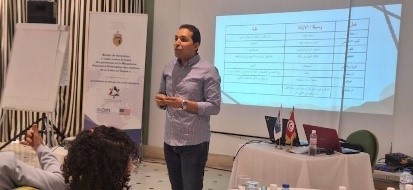The collaboration between national authorities and journalists, a fruitful partnership in the fight against human trafficking
Posted at February 1st 2024 12:00 AM | Updated as of February 1st 2024 12:00 AM
Region/Country : Madagascar, Tunisia
|Thèmes : Fair recruitment, Media
In Madagascar and in Tunisia, journalists are directly involved in the activities of anti-trafficking authorities. Their engagement is useful as it fosters relationships between the authorities and the media landscape and, therefore, helps produce better information on this issue. Malek Khaldi and Jerry Edouard share their experiences.
The Bureau National de Lutte contre la Traite des Êtres Humains (BNLTEH) is an anti-trafficking authority established in Madagascar in 2015, within the 2014-040 law. It operates in a country which is currently considered a Tier 2 Watch List (out of 3) country in the US State Department annual TIP report. Jerry Edouard, the head of publication of Dream’in, is a member of the Bureau in his journalist capacity.
Although efforts have been made in recent years by the Malagasy government, the report from the State Department recommends a set of priority actions. In response, the BNLTEH is working to amplify its work, with the objective of aligning with the recommendations mentioned in the report. Building partnerships with journalists can have positive effects with regards to awareness raising, citizen education, data collection and the identification of human trafficking cases. Journalists can benefit from the actions carried out by the BNLTEH and access precise and reliable information.
It is with this idea of partnership that a training course for 30 journalists was held on July 4 and 5, 2024. This activity is the result of a partnership between the BNLTEH, the Order of Journalists of Madagascar (OJM) and the NGO Women Lead Movement Madagascar (WLM). The objectives were to inform journalists and stakeholders on key concepts related to human trafficking. The capacity building focused on recalling the foundations of journalism ethics and sharing tools to identify, report, and combat human trafficking. Jerry Edouard, who served as a trainer for this workshop, used various resources that he contributed in developing over the years, notably the International Labour Organization Toolkit and the Media-Friendly Glossary on migration in Madagascar, fair recruitment and forced labour edition.
This type of partnership between journalists and the BNLTEH can amplify the Bureau’s impact in combatting human trafficking. It allows journalists to familiarize themselves with the work of the Bureau, understand the complexity of human trafficking and discover practical tools to produce relevant and ethical reports.
In Tunisia, a multi-year strategy to support the work of the national authority
Since its creation in 2016, the National Authority for the Fight against Human Trafficking (INLCTP) has been engaging with Tunisian journalists and media organizations to raise awareness on this issue. In collaboration with the International Organization for Migration (IOM), the International Labour Organization (ILO), the National Union of Tunisian Journalists (SNJT) and the Institute of Press and Information Sciences (IPSI), the authority adopted a comprehensive strategy, with the objective of reaching more than 500 journalists – professional and student – over the 2018-2023 period.
This strategy was designed with the aim of strengthening the capacities of journalists and students in the fight against trafficking and raising their awareness on forced labour, notably of migrant workers. At the same time, the strategy was designed to contribute to the creation of a network of specialized journalists, the "reference journalists".
The training sessions provided journalists with key elements (statistics, resource persons, experts, etc.) necessary for the regular coverage of the subject, the production of human stories or reports on trafficking crimes.
Following these capacity building workshops, the Tunisian journalists could become focal points of the Authority in the regions. In 2020, during the Covid-19 pandemic, the INLCTP received the first reports from journalists on potential trafficking victims.
In 2021, the ILO and the INLCTP disseminated a digital toolkit in Arabic on the media coverage of fair recruitment and forced labour, intended for Tunisian journalists.
This collaboration was set up by Malek Khaldi, journalist and member of the INLCTP, where he represents the media sector. He acts as a link between the Authority and his fellow journalists. This liaison role ensures rapid access to information for journalists and eases the Authority's communication efforts towards the broader public.
Students at IPSI, the main journalism school in Tunisia, also benefited from this collaboration strategy with the integration of a module on the fight against trafficking in the general “human rights” course, as well as training, awareness-raising sessions and a competition for the best student article on reporting forced labour.
This dynamic of collaboration continued during the Blue Heart campaign, which takes place each year on July 31. In 2024, around twenty journalists gathered in Tunis to take part in a two-day training session, focused on the National Orientation Mechanism (MNO) for victims in Tunisia.
**
The experiences in Madagascar and Tunisia are good practices in terms of cooperation between public actors in the fight against human trafficking and the journalistic sector. They contribute to capacity building, awareness raising, prevention and access to information. Other countries could draw inspiration from these actions and consider the participation of journalists in national anti-trafficking authorities, in the spirit of partnership that must guide efforts to combat this scourge.


